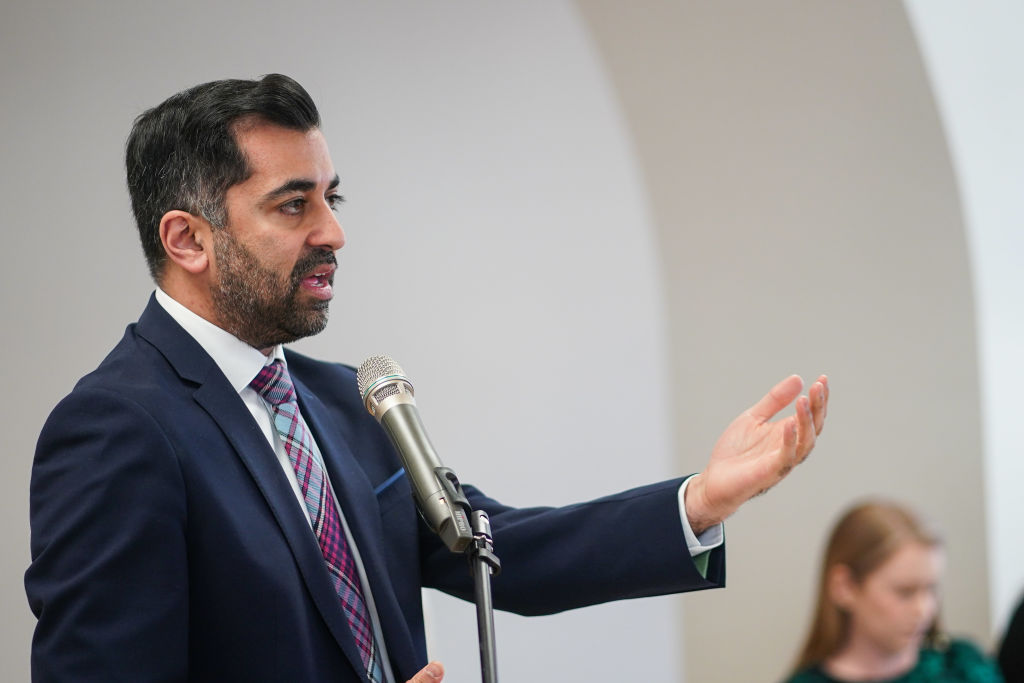In Scotland, everything from eye tests to prescriptions to university tuition is paid for by the state, even if you can easily afford to pay for it yourself. Such is the intoxicating effect of universal benefits that the only question up for debate in the Scottish Parliament is what else can be given to everyone for free, rather than what is most effective or affordable.
That was until Humza Yousaf became First Minister. In need of a political lift following the police investigation into the SNP’s finances, Yousaf has engineered a significant break – not just with his predecessor, Nicola Sturgeon, but with the Scottish political consensus that had nurtured his career to date. At a cross-party anti-poverty summit in Edinburgh yesterday, Yousaf scrapped Sturgeon’s pledge to introduce free school meals in secondary schools and indicated universal benefits will no longer be the uninterrupted mantra of the SNP. Instead, he said the focus would shift to targeting benefits towards those most in need:
‘I’ve got a 14-year-old now. Should people be paying for her free school meals when I earn a First Minister’s salary? I don’t think that’s the right way to use that money – a better way is to target those that need it absolutely the most.’
This is not only right in principle, but also in practice, particularly given the strained nature of public finances. It cannot be right – at least for anyone that likes to present themselves as progressive, as the Scottish political establishment is wont to do – to subsidise the rich at the expense of the poor.
The problem for Yousaf is his failure to apply this sound principle to its logical conclusion. If we agree that targeted benefits are the right policy in this instance, why is that suddenly not the case when it comes to free university tuition or free prescriptions? Or, to put it another way, why should we pay for the First Minister’s daughter to go to university when that money could be better spent helping someone from a disadvantaged background go on to higher education? Yousaf’s reluctance to tackle these difficult and controversial questions – indeed, he has already insisted free tuition and prescriptions will remain as is – undermines an otherwise sensible position.
Not that the other political parties in Scotland are any better. The addiction to universal benefits is difficult to shake, and no one else is yet willing to join Yousaf. Indeed, the very notion it might be better to give a poor child more and a middle-class child nothing is seemingly anathema, as is the courage to tell voters you need to now charge them for something that was previously free.
Scottish Labour’s Monica Lennon immediately branded Yousaf’s decision to scrap free school meals in secondary schools a ‘betrayal’. But she failed to explain how her party would pay for a universal scheme, or why it would be more effective than a targeted one. This is not serious politics, especially from a party that now aspires to government. Alex Salmond’s Alba party is also up in arms about Yousaf’s declaration, sending around a petition this afternoon that demands all children in Scotland receive free school meals.
It is early days in his premiership and Yousaf has already suffered from being labelled the continuity candidate from the Sturgeon era, but this latest move marks a clear divide from the past. If he is able to follow through – and even have the courage to expand the principle of targeting further – he may be able to outflank his opponents, who currently remain addicted to maintaining a consensus they desperately need to challenge. Yet while this could be the moment for important change in Scottish politics, thanks to the troubles the SNP is facing, it is unlikely anything will be able to to save Yousaf’s premiership.






Comments